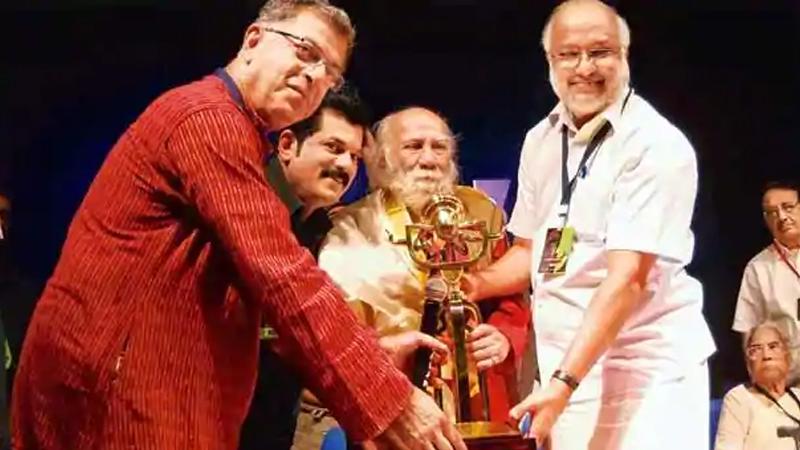Badal Sarkar

Badal Sarkar was an actor, playwright, director, and all of them theater theorists. He was one of India's most famous playwrights.
Badal Sircar, also known as Sarkar, was an influential Indian playwright and theater director, known for his anti-Naxal drama during the Naxalite movement in the 1970s, and theater as a proscenium and public sector. , When he founded Centenary's own theater company in 1976. He composed more than fifty plays, of which the famous literary pieces of Igong Indrajit, Basi, and Sari Raat played pioneering roles in street theater with his egalitarian "Third Theater" in experimental and contemporary Bengali theater, he wrote his Anganamancha (courtyard Stage), and remained one of the most translated Indian playwrights.
Carrier
While working as a city planner in India, England and Nigeria, he entered the theater as an actor, moved in direction, but soon began writing plays, starting with comedies like Badal Sikar in a dramatic environment such as stage , Experimented with costumes and presentation and established a new generation of theater called "Third Theater". In the third theater approach, he made direct contact with the audience and emphasized expressionist acting alongside realism. He began his acting career in 1951, when he starred in his own play, Barchi Trishna, presented by Chakra, a theater group
Finally still employed in Nigeria, he wrote his historical play Igang Indrajit (and Indrajit) in 1963, which was first published and performed in 1965, and was immediately captivated to fame, because It was "occupied with the loneliness of urban youth after independence with the despair of freedom". They included Baqi Etihash (Remaining History) (1965), Pralap (Delirium) (1966), Tingha Centenary (3rd Century) (1966), Pagla Ghoda (Paad Horse) (1967), Shesh Nai (End of Na) (1969), All performed by the Bohurupi group of Sumbhu Mitra.
Literature critic Chinmay Guha's statement
Renowned art and literature critic Chinmay Guha has written in 'Ananda Bazar Patrika', discussing the life and work of Badal Sarkar, which is quite remarkable - 'A hundred years from now, perhaps there is a debate on whether the twentieth and twenty-first century During the treaty period, there were three Badal Sarkars at the same time, one of which wrote a very influential comedy drama, with its sharp look at the nuances of comic situations, filled with intellectually intense dialogues on Saras. Others, who had recorded their voice in their plays against violence in society, black shadow of war due to world political tussle, nuclear weapons, terror and growing economic inequality in society and third, who imprisoned inside auditoriums I had dreamed of bringing the entertainment-oriented theater to the general public under a blanket. '
Development of Indian theater
A hundred years from now, readers will probably find it difficult to characterize these three Badal Sarkars as a single personality. But it is a matter of relief that due to the commonality of the happiness and sorrow of the Indian people, their concerns, their problems and their exploitation by power, they had created a unique identity - by breaking the walls between language, province and culture. The development of Indian theater was made possible with this specific identity as the basis. Through the means of cinema-television and all other entertainment, where the culture of power was becoming widely active against the mass culture and was confusing them with the concerns and questions of the public, then it was not just for the purpose of social change, just To keep alive a culture of nationwide resistance, the Third Theater played an important role.
Awards and recognition
Government in 1971 with the prestigious Jawaharlal Nehru Fellowship in 1971, Padma Shri by the Government of India in 1972, Sangeet Natak Akademi Award in 1968 and Sangeet Natak Akademi Fellowship - Ratna Sadas, with the highest honor in the performing arts by the Government was awarded. In 1997, the National Academy for Music, Dance and Drama of India was given by Sangeet Natak Akademi.
The "Tendulkar Mahotsav", held at Pune's National Film Archives (NFAI) in October 2005 to honor playwright Vijay Tendulkar by director Amol Palekar, was inaugurated with the release of DDV and a book on the life of Badal Sarkar Was inaugurated. .
In July 2009, to mark his 85th birthday, Uddwe was named Ustava along with all the leopards in the name of the five-day festival. He was offered the Padma Bhushan by the Government of India in 2010, which he declined, stating that he was already a Sahitya Akademi Fellow, the greatest recognition for an author.
लेख के प्रकार
- Log in to post comments
- 274 views
